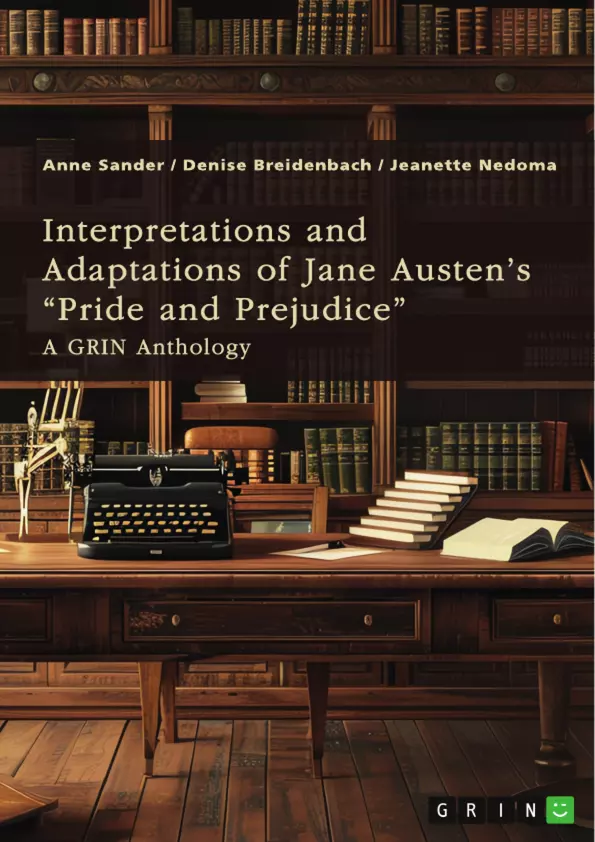Anthology of three titles.
The first title compares the personality of Elizabeth in "Pride and Prejudice" and in "The Lizzy Bennet Diearies". In Pride and Prejudice, Lizzy Bennet wants to marry but only for love and not because her mother is telling her to. She rejects Mr. Collins' and Mr. Darcy's first proposal because she does not love them. Eventually Lizzy does get married, because she falls in love with Mr. Darcy and accepts his second proposal, thereby fulfilling her intention to marry for love. In The Lizzie Bennet Diaries, Lizzie is a grad student, living at home together with her parents and her two sisters. She is single, but getting a boyfriend is not one of her concerns.
The second term paper, in which I will compare Austen’s "Pride and Prejudice" with Fielding’s "Bridget Jones’s Diary", will show that the skills women should have are still relevant in our society today. To confirm my ideas I will first discuss feminist theory, and then I will deal with the following topics which are included in both novels: education, skills, career; finding a husband and marriage; and the appearance of women. I want to contrast several female characters of Pride and Prejudice with Bridget Jones. In addition, this term paper will describe the pressure that young single women have to face in the 19th and 20th century.
The third paper will show that Pride and Prejudice and Zombies is a parody. It will identify and discuss the elements and strategies that are typical of parodies. What gets parodied and how? What effect does this create? These are the central questions this paper seeks to answer. First of all, the approaches of several post-modern theorists such as Linda Hutcheon and Simon Dentith will serve as basic definitions in order to explain the theoretical aspects and properties of parodies. Important characteristics such as the paradox nature of parodies and the theory of encoding and decoding will be taken into account. The second part will consist of a close analysis of parodic strategies in Pride and Prejudice and Zombies, focusing not only on the formal characteristics of this parody, but also on some features of both 18th century society and the style of the narrative found in Pride and Prejudice that are most prominently parodied.
Inhaltsverzeichnis (Table of Contents)
- From Carriages to Career. Social Security in Pride and Prejudice and The Lizzy Bennet Diaries
- Introduction
- Elizabeth
- Pride and Prejudice
- The Lizzie Bennet Diaries
- Charlotte
- Pride and Prejudice
- The Lizzie Bennet Diaries
- Conclusion
- The Role of Women. A Comparison of Jane Austen's Pride and Prejudice & Helen Fielding's Bridget Jones's Diary
- Introduction
- Feminist Theory
- Comparison of Austen's Pride and Prejudice and Fielding's Bridget Jones's Diary
- Education, Skills and Career
- Finding a Husband& Marriage
- Appearance
- Conclusion
- Literature
- Internet Sources
- Parodic Elements, Women and Power in Pride and Prejudice and Zombies
- Introduction
- Defining Parody
- Post-modern Theory of Parody
- The Paradox of Parody
- Encoding and Decoding
- Parodic Elements in Pride and Prejudice and Zombies
- Formal and Stylistic Aspects
- The Female Biography
- The Construction of Power
- The “Unmentionables” as a Metaphor
- Conclusion
- Works Cited
- Literature
- Criticism
- Individual Publications
Zielsetzung und Themenschwerpunkte (Objectives and Key Themes)
This anthology explores various interpretations and adaptations of Jane Austen's classic novel "Pride and Prejudice," examining how themes of social security, gender roles, and power dynamics are reimagined in contemporary works.
- Social security and its impact on women's lives in different historical contexts.
- The changing roles and expectations of women in society.
- The use of parody as a literary technique to critique and subvert traditional narratives.
- The representation of power dynamics and the construction of gender in literature.
- The influence of feminist theory on literary interpretations and adaptations.
Zusammenfassung der Kapitel (Chapter Summaries)
The first chapter, "From Carriages to Career," explores the theme of social security in Jane Austen's "Pride and Prejudice" and its modern adaptation, "The Lizzie Bennet Diaries." It contrasts the economic realities of women in the 19th century with contemporary opportunities and examines how societal expectations of marriage and career paths have evolved.
The second chapter, "The Role of Women," delves into feminist theory and its application to both "Pride and Prejudice" and Helen Fielding's "Bridget Jones's Diary." It compares the characters' experiences with education, marriage, and societal pressure on their appearance, shedding light on how gender roles and expectations have been reinterpreted over time.
The third chapter, "Parodic Elements, Women and Power in Pride and Prejudice and Zombies," analyzes the use of parody in Seth Grahame-Smith's adaptation of "Pride and Prejudice." It examines the novel's formal and stylistic elements, the portrayal of female agency, and the construction of power in a zombie-infested world. It also explores how the "unmentionables" of the original text become a metaphor for the societal limitations and expectations faced by women.
Schlüsselwörter (Keywords)
This anthology focuses on key themes and concepts such as social security, gender roles, power dynamics, parody, feminist theory, literary adaptations, and the representation of women in literature. It examines these themes through the lens of Jane Austen's "Pride and Prejudice" and its various interpretations and adaptations, including "The Lizzie Bennet Diaries," "Bridget Jones's Diary," and "Pride and Prejudice and Zombies."
- Arbeit zitieren
- GRIN Verlag (Hrsg.) (Herausgeber:in), Anne Sander (Autor:in), Denise Breidenbach (Autor:in), Jeanette Nedoma (Autor:in), 2024, Interpretations and Adaptations of Jane Austen's “Pride and Prejudice”, München, GRIN Verlag, https://www.grin.com/document/1494820



